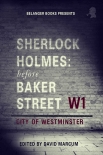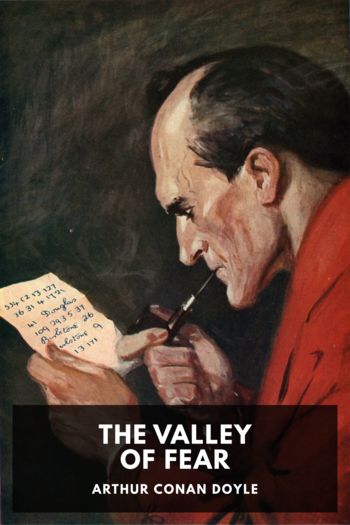Sherlock Holmes: Before Baker Street by David Marcum (books to read to be successful TXT) 📗

- Author: David Marcum
Book online «Sherlock Holmes: Before Baker Street by David Marcum (books to read to be successful TXT) 📗». Author David Marcum
“‘My ancestor, Sir Ralph Musgrave, as a prominent Cavalier and the right-hand man of Charles the Second in his wanderings,’ said my friend.
“‘Ah, indeed!’ I answered. ‘Well now, I think that really should give us the last link that we wanted. I must congratulate you on coming into the possession, though in rather a tragic manner of a relic which is of great intrinsic value, but of even greater importance as an historical curiosity.’
“‘What is it, then?’ he gasped in astonishment.
“‘It is nothing less than the ancient crown of the kings of England.’
“‘The crown!’
“‘Precisely. Consider what the Ritual says: How does it run? “Whose was it?” “His who is gone.” That was after the execution of Charles. Then, “Who shall have it?” “He who will come.” That was Charles the Second, whose advent was already foreseen. There can, I think, be no doubt that this battered and shapeless diadem once encircled the brows of the royal Stuarts.’
“‘And how came it in the pond?’
“‘Ah, that is a question that will take some time to answer.’ And with that I sketched out to him the whole long chain of surmise and of proof which I had constructed. The twilight had closed in and the moon was shining brightly in the sky before my narrative was finished.
“‘And how was it then that Charles did not get his crown when he returned?’ asked Musgrave, pushing back the relic into its linen bag.
“‘Ah, there you lay your finger upon the one point which we shall probably never be able to clear up. It is likely that the Musgrave who held the secret died in the interval, and by some oversight left this guide to his descendant without explaining the meaning of it. From that day to this it has been handed down from father to son, until at last it came within reach of a man who tore its secret out of it and lost his life in the venture.’
“And that’s the story of the Musgrave Ritual, Watson. They have the crown down at Hurlstone – though they had some legal bother and a considerable sum to pay before they were allowed to retain it. I am sure that if you mentioned my name they would be happy to show it to you. Of the woman nothing was ever heard, and the probability is that she got away out of England and carried herself and the memory of her crime to some land beyond the seas.”
A Day at the Races
by Mark Mower
It had long been a habit of mine to cast off the shackles of my professional life and to make the annual pilgrimage to Epsom Downs in order to meet up with a group of old student friends from Pembroke College, Oxford. Our get-together at the Derby Stakes was predicated upon the enduring friendship that we still enjoyed and the chance to indulge in a day of mirth, gambling, and drinking. And it was in this most unlikely of settings that I first encountered Mr. Sherlock Holmes.
It was on a Wednesday in the early part of June 1880 that my story began. That afternoon, I had enjoyed some small success, having placed my usual stake of one guinea on the nose of the Duke of Westminster’s thoroughbred Bend Or, ridden at that time by the immensely talented Fred Archer. Having collected my winnings, I readily agreed to buy our party of eight some Champagne in a marquee near the Tattenham Corner end of Epsom Fair. While seating ourselves around a large trestle table just inside the canopy, my dear friend Cedric Stone began to gesticulate wildly in the direction of a tall, thin-looking fellow, who sat alone at one of the tables close to the main bar. With a wholehearted invitation to join us, the young man pulled up a chair and was soon introduced to our boisterous party. Stone explained that our guest was a private detective from London who had recently assisted his father in recovering a valuable diamond ring from the clutches of a well-known gentleman thief. To a further round of loud cheers and the evident embarrassment of the man, we welcomed Holmes to the group and insisted that he partake of some refreshment with us.
It was gloriously hot and sunny that afternoon, and despite the hustle and bustle of the busy marquee, Holmes soon looked to be relaxed in our company. I guessed he was still in his twenties and some five or six years younger than most of us. Gaunt and eagle-eyed, in a smartly-tailored Norfolk jacket, cap, and breeches, I found him to be observant, direct and witty, and charming in his general manner. There was no doubting his keen intelligence, and he seemed conversant on most subjects – including earlier Derby winners – explaining that he and his brother regularly attended the Classics. However, he was quick to point out that his visit to the Derby that year had nothing to do with his fondness for the turf. In fact, he had just completed a case linked to horseracing, of which he could say no more.
Within an hour or so, our party began to disperse, some colleagues saying their goodbyes before returning to London or Oxford, and a couple arranging to travel further afield. That left just Cedric and I in the company of Holmes, who seemed keen to stick with us and head for a quieter part of the fair. A short time later, we were seated at a small wooden table in a more convivial setting, enjoying a pot of tea and a thick slice of Madeira cake with the gentle sound of accordion music being played close by.
“Tell me, Mr. Hughes, what made you become a school master, when your real passion in life appears to be the study of





Comments (0)